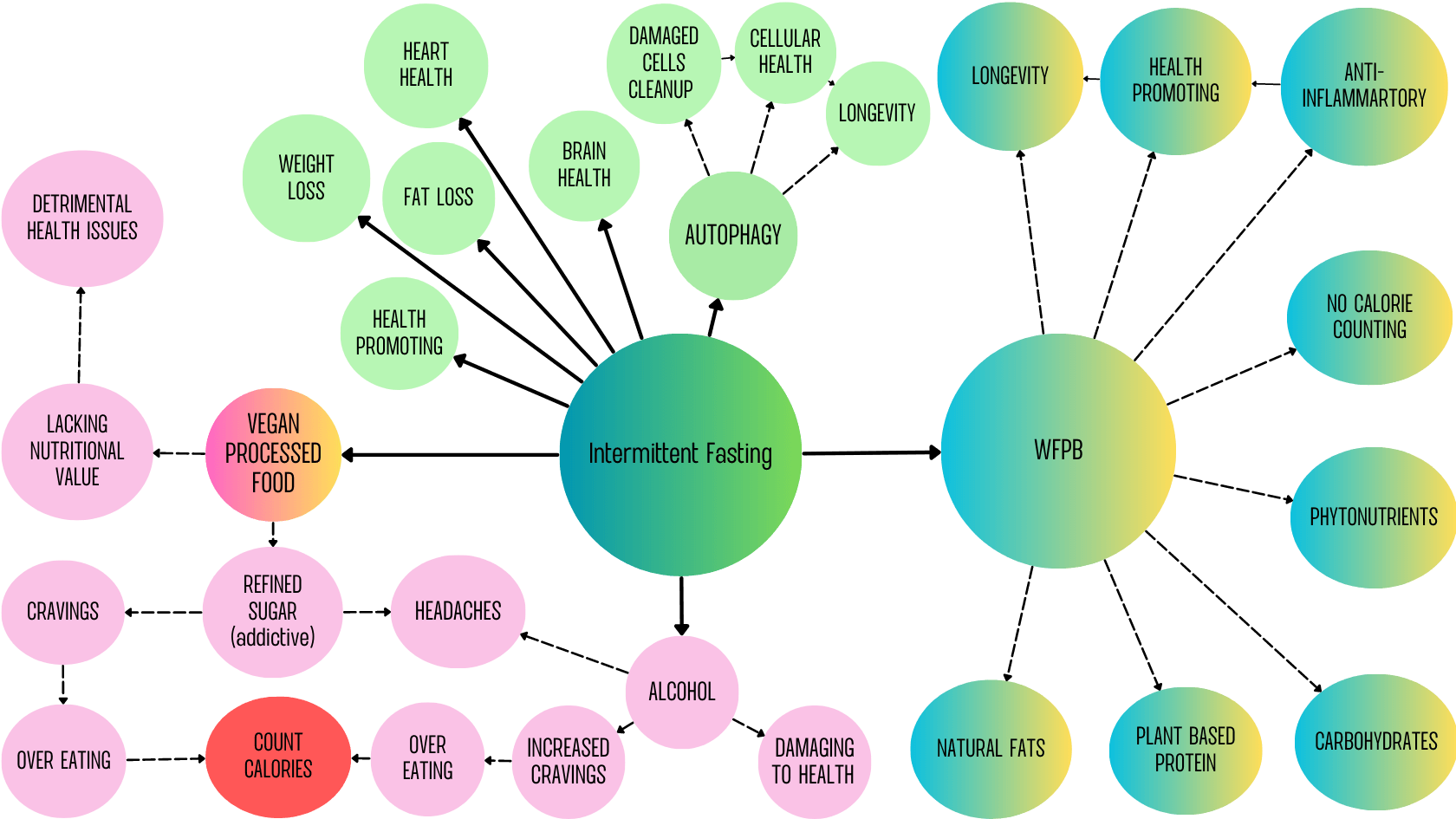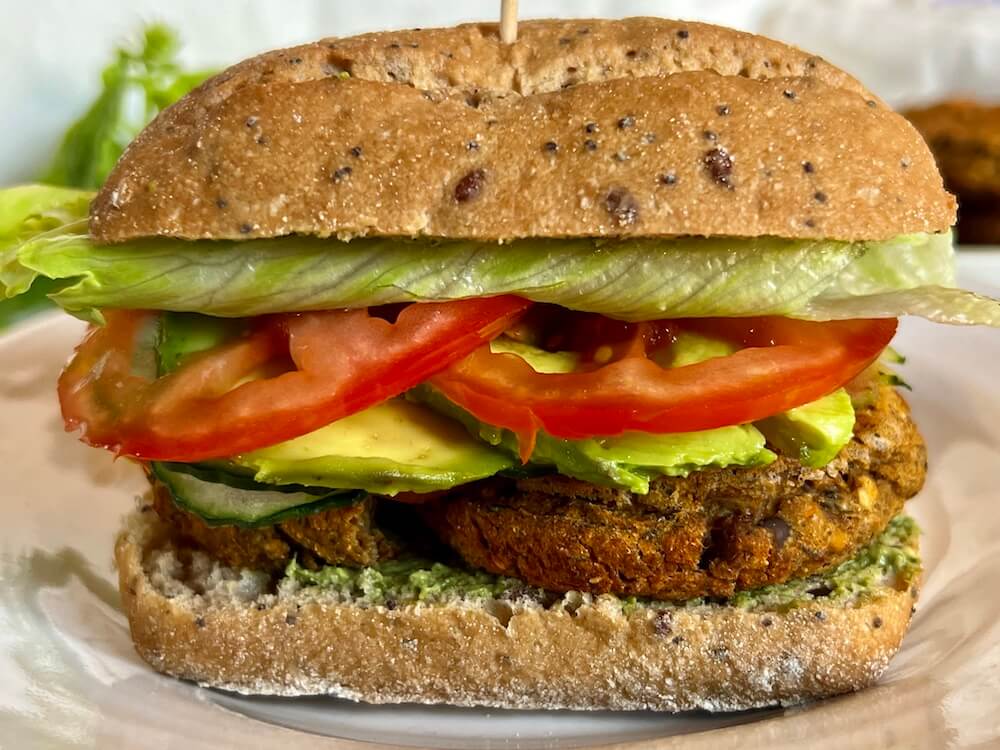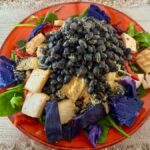So, the golden question; can you eat whatever you want while intermittent fasting?
And more to the point, will you still get the results you want?
Maybe you’ve already tried to get to the bottom of this question but only found contradictory information.
In that case I hear you.
It’s a jungle out there with one side saying yes you can and the other crying no you can’t.
So which is it?
In this post we’re going to look at this from all sides and explain how you can decide what to eat while doing intermittent fasting – and whether you’ll want to include your favourite pizza or not.
Table of Content
- If You Only Have a Minute:
- What is Intermittent Fasting?
- Why do People Do Intermittent Fasting?
- Ask Yourself: What’s Your Goal With Intermittent Fasting?
- Can I Lose Weight By Intermittent Fasting?
- Can I Still Include My Favourite Foods and Lose Weight?
- Intermittent Fasting for Vegans
- Do I Need to Eat Protein While Intermittent Fasting?
- Should I Eat Natural Fats While Intermittent Fasting?
- Dr Mindy Pelz on Fasting for Vegans
- Final Thoughts of Can You Eat Whatever You Want While Intermittent Fasting?
If You Only Have a Minute:
Although you can eat whatever you like and practise intermittent fasting, you won’t get the full benefits of IF if you don’t also pay attention to what you eat. The term itself only refers to restricting your eating window, (i.e. to an 8, 6, or 4 hour window) but the actual benefits are intrinsically to what we eat. If you want to enjoy a long and healthy life, you need to eat healthy food. If you want to lose weight, you need to be aware of what you eat and how much you eat. Eating too many calories can cause weight gain even when practising IF. Intermittent fasting has incredible health benefits and weight loss opportunities, including fat burning, increasing insulin sensitivity and a cellular clean-up. But it’s real advantage happens when we couple it with a healthy diet. When a WFPB diet is your lifestyle you automatically eat more healthily because you cut out refined foods, processed foods, refined sugars, additives and added ingredients. If you eat a high-carb diet based on processed foods, you will need to count your calories in order to lose weight whereas if you eat a wfpb diet, it’s more likely that you can indeed eat whatever you like while practising IF. Ultimately every person is unique with their own metabolic system, health profile, age, activity levels, gene pool and eating habits. And how they respond to IF will also be affected by all these things and more.
What is Intermittent Fasting?
Intermittent fasting, or more accurately described as time-restricted eating, is about reducing your eating hours and lengthening your fasting time.
The most popular combinations are 16:8 (16 hours fasting: 8 hours eating), 18:6, 20:4 and OMAD (one meal a day).
Ok, so there’s an awful lot more to know about intermittent fasting before jumping in feet first, but we covered IF at length in our complete guide to intermittent fasting for vegans, so I recommend you give that a read if you have any doubts about what IF really involves.
The actual name intermittent fasting only refers to the time-frame of eating, not the actual food you eat.
So technically, you can say that intermittent fasting allows you to eat whatever you want.
But that’s just relating to the fact that you’re eating at certain times during the day.
What about the benefits?
And what about the motivation for IF?
The bottom line is, will IF still work for you if you eat whatever you want?
And to answer that, we need to think about what our goals are.
Why do People Do Intermittent Fasting?
There are many reasons to do intermittent fasting:
Ask Yourself: What’s Your Goal With Intermittent Fasting?
Is your primary goal to lose weight?
. . . to live longer?
. . . to enjoy better health generally?
. . . to combat a specific health issue?
Or maybe you have stubborn fat reserves stored around your belly and you’ve decided it’s time to part ways and say adios, once and for all?
Perhaps you started out on this journey because you want to lose weight, but now you’ve seen all the incredible benefits that are up for grabs you want to sunbathe in all of them?
Your goal is your motivation and that has everything to do with the decision of what to eat while intermittent fasting.
Let’s have a look at a common reason for doing IF: losing weight.
Can I Lose Weight By Intermittent Fasting?
Yes, sureeee you can!
Intermittent fasting’s actually great way to lose weight. Because IF is a way of life, and a way of life that can make you feel fabulous at that, it’s less about obsessing about food and more about rejoicing your food.
We’ve all been there – carefully controlling every morsel of food that passes our lips and counting the calories, day in day out, only to find that two months later we’ve put on every kilo which we had so painstakingly lost.
Intermittent fasting’s different. It makes your body more efficient at losing weight.
It also makes your body more efficient at burning fat. When done right, it also changes how your hormones send you hunger signals, so your appetite can actually drop.
Cravings can go away.
So if it works for you, it’s quite a different experience to normal dieting.
IF isn’t dieting. It’s way way more.
And yes, it’s an effective way to lose weight.
It works through a variety of mechanisms so without further ado, here they are:
Mechanisms for Losing Weight While Intermittent Fasting
Can I Still Include My Favourite Foods and Lose Weight?
If you look at the mechanisms involved in losing weight from intermittent fasting (which are listed above) you can see that it isn’t just one thing but a whole interaction of different factors.
So when asking the question, you need to consider a myriad of points – if you want to come up with the correct answer for you personally, as an individual.
So, the short answer to the question is yes and no and it depends.
It depends on so many things –
These are just a few of the questions you’ll need to think about before deciding whether to eat your favourite foods. It’s very similar to the question of what you can drink in your eating window of IF.
It depends on your goals.
And we’re not talking once in a blue moon, because that would be a clear YES. Once in a blue moon of course you can eat your favourite food!
But on a regular basis, it will depend on what your favourite food is and all the other points listed above.
If you eat a wfpb diet, because we’ve already kicked junk food out the door, life gets that much easier with IF.
It won’t matter that you go out for pizza if you’re eating wfpb every day at home. You won’t need to count calories or fuss about what you’re eating.
But if you mainly eat processed foods, then you’re looking at a different story.
The premise of a wfpb diet is to focus on our foods being health-promoting and not focus on counting calories.
But if we eat enormous amounts of healthy food and we don’t do any exercise at all, we can still be in a calorie surplus and we can still put on weight.
However, when we depend on processed foods we’re much more likely to over eat, because of all the added refined sugars which set up a food-craving situation.
Intermittent Fasting for Vegans
It’s all about balance.
Looking at the graph below, if you mix in an occasional pink circle to a standard norm of the green, you most probably won’t come up against any problems.
But if you only eat from the pink, then you’re likely to get the associated consequences and issues can become manifest.

And incase you haven’t yet heard of just how powerful a WFPB diet is, here’s a short video about a man who reversed his type 2 diabetes through switching to a WFPB diet.
Just imagine then, how powerful WFPB is when coupled with IF!
Do I Need to Eat Protein While Intermittent Fasting?
It’s important to eat enough plant protein when doing IF even though the whole conversation around plant protein is a much argued debate.
Most people will agree that protein helps with satiety and muscle repair and growth as well as being instrumental for promoting weight loss.
Great sources of gluten free plant proteins include: beans, peas, chickpeas, lentils, tofu, tempeh, nuts and seeds.
Should I Eat Natural Fats While Intermittent Fasting?
It’s also important to include natural fats in your diet when doing intermittent fasting.
Many people practise keto (high protein, low carb) but for a WFPB diet, keto isn’t very practical because to cut out the carbs you would miss out on many important foods.
Instead, you can ensure enough protein and include some natural fat with each meal.
As you body is going to switch over to burning fat, it will be able to metabolise the fat in your diet efficiently.
Great sources of natural fat are avocados, nuts, seeds, and raw extra virgin olive oil.
Dr Mindy Pelz on Fasting for Vegans
It’s interesting to see that although Dr Mindy isn’t actually promoting a WFPB diet, the 3 foods she says to avoid are all non-WFPB foods and the 5 foods she says you must include are all WFPB!
It’s a shame that she recommends eating fish or eggs for protein and this is a point I would personally not consider for a moment.
If you watch this video, don’t forget that she isn’t talking about a whole foods plant based diet, but just plant based.
Final Thoughts of Can You Eat Whatever You Want While Intermittent Fasting?
I hope this post has highlighted the huge variation of possibilities and the enormous benefits of doing IF and WFPB together.
The world is your oyster! You can become the healthiest version of yourself!
And I promise you, if you do the work in your head first (i.e. let your subconscious mind know why you want to change your eating habits first), then you’re going to be so glad you started this journey!
Welcome to the world of intermittent fasting!
Let me know how you get on.








